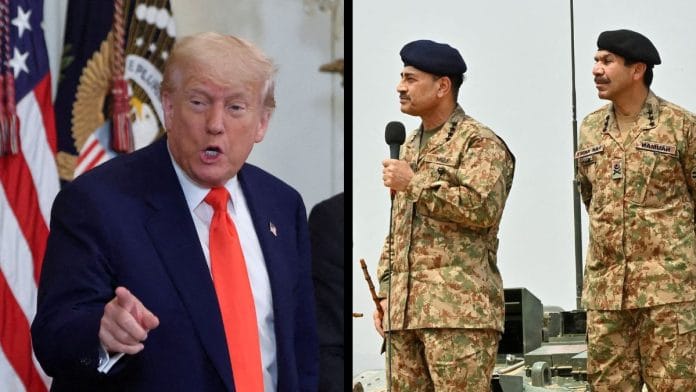New Delhi: The United States and Pakistan have agreed to deepen counterterrorism ties and cooperation in other domains after a meeting between US President Donald Trump and Chief of Army Staff of Pakistan Field Marshal Asim Munir in Washington D.C. Wednesday, the Pakistani military has said.
“President Trump lauded Pakistan’s ongoing efforts for regional peace and stability and appreciated the robust counterterrorism cooperation between the two states. Both sides reaffirmed their commitment to continued collaboration in the field of counterterrorism,” the Pakistan military’s readout has said.
In what the Pakistan military claimed to be a show of the “depth and cordiality of the dialogue,” the meeting went on for two hours despite being scheduled for an hour.
The Pakistan military has said that “bilateral cooperation” in multiple domains, including trade, economic development, mines and minerals, artificial intelligence, energy, cryptocurrency, and emerging technologies, was discussed.
Trump, it added, expressed a “keen interest in forging a mutually beneficial trade partnership with Pakistan based on long-term strategic convergence and shared interests”.
“During the meeting, the Chief of Army Staff (Munir) conveyed the deep appreciation of the government and people of Pakistan for President Trump’s constructive and result-oriented role in facilitating a ceasefire between Pakistan and India in the recent regional crisis. The COAS acknowledged President Trump’s statesmanship and his ability to comprehend and address the multifaceted challenges faced by the global community,” the statement added.
The engagement—held in the Cabinet Room, followed by a visit to the Oval Office—marked the first time the US President officially received a serving Pakistani army chief, who does not hold any political office.
Secretary of State Senator Marco Rubio and Special Representative for Middle Eastern Affairs Steve Witkoff accompanied Trump. Munir—elevated to rank of Field Marshal after the recent India-Pakistan flare-up—had Pakistan’s National Security Adviser and Intelligence Chief Lt Gen Muhammad Asim Malik with him.
Complicated security partnership
The Trump administration earlier this year approved the release of $397 million to Pakistan to support the maintenance of its F-16 fighter jet fleet for counterterrorism operations.
The decision stood out as it came despite his executive order after assuming office in January, imposing a 90-day freeze on all foreign aid.
According to Reuters, funding approval for Pakistan falls under one of the 243 exceptions granted by the Trump administration, with $5.3 billion released so far. Of the amount, $4.1 billion remains tied to the US State Department for military and arms programmes.
The $397 million allocation continues a precedent set by the previous Biden administration in September 2022, when it approved a $450 million package to maintain Pakistan’s F-16 fleet, with the express condition that Islamabad would use the aircraft solely for counterterrorism and not against India.
The Trump-Munir White House meeting marked the close but often contentious US-Pakistan counterterrorism partnership, which has lasted over two decades.
CENTCOM Commander General Michael Kurilla last week referred to Pakistan as a “phenomenal counterterrorism partner,” a rare and public endorsement from a senior American military leader.
Former Pentagon official Kash Patel also confirmed the critical role Pakistan played in the extradition of an ISIS facilitator from Canada to the United States earlier this year.
The inclusion of cryptocurrency in the talks has drawn the most attention.
Analysts and insiders noted that “crypto-linked influence networks” and non-traditional lobbying efforts in Washington partially facilitated the Trump-Munir engagement, bypassing formal diplomatic channels. The new dynamic could signal a broader shift in how Pakistan will engage with US policymakers, particularly in the emerging technology sector.
Regional dynamics
A key part of the dialogue was the ongoing Israel-Iran conflict. Both Trump and Munir reportedly emphasised the need for a resolution. Trump earlier noted that Pakistan has a deep familiarity with Iran—Islamabad represents Iranian interests in Washington DC. He also said that Munir “agreed with me” on the importance of preventing escalation.
“They know Iran very well, better than most… They are not bad with Israel, either. They know them both,” Trump told reporters after the meeting. However, the Pakistan military readout did not mention anything on this front.
In a symbolic gesture, Munir has invited Trump to undertake an official visit to Pakistan at a mutually convenient date—a proposal the Inter-Services Public Relations (ISPR), Pakistan, described as reflecting the “warmth of bilateral ties”.
Pakistani government officials, including Defence Minister Khawaja Asif, hailed the meeting as “pre-scheduled” and an example of the “unprecedented warmth” between the countries.
However, critics have expressed alarm over the implications of such a high-level meeting for civilian supremacy and democratic norms in Pakistan.
(Edited by Madhurita Goswami)







When the allotted hour comes to end Munir asked how Pakistan may join the cryptocurrency of brand Trump and it took another hour for the President to explain